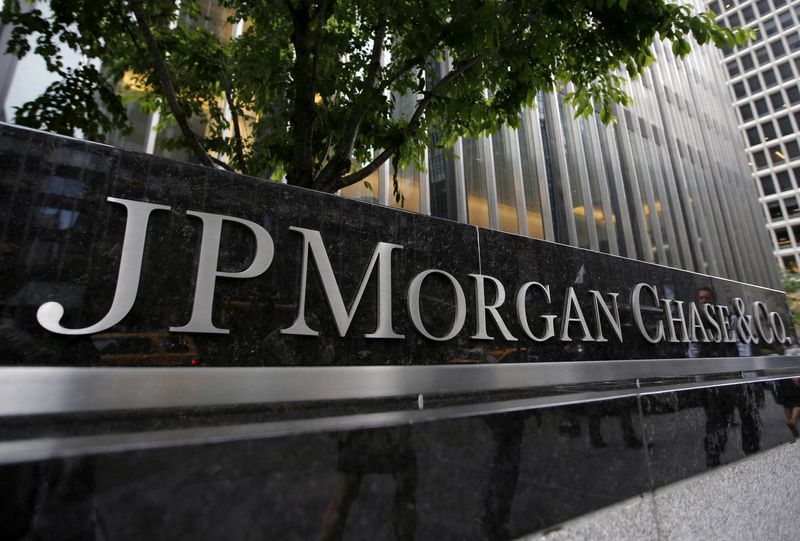By Nupur Anand and Niket Nishant
(Reuters) -JPMorgan Chase's profit beat estimates in the first quarter, but its shares fell 6% after forecasts for interest income fell short of analysts' expectations on Friday.
The largest U.S. lender slightly increased its estimate for net interest income (NII), or the difference between what a bank earns on loans and pays out for deposits. But investors wanted more, hoping that the bank would reap greater benefits from a prolonged period of higher interest rates.
"What the market really needed was some really positive go-forward statements," said Rick Meckler, partner at Cherry Lane Investments, a family investment office in New Jersey. "We did not get that."
CEO Jamie Dimon in a statement reiterated his cautious view on "a number of significant uncertain forces" that could weigh on the economic outlook, including "unsettling" global conflicts, persistent inflationary pressure and quantitative tightening.
Despite the warning, "the American economy is strong," Dimon told journalists on a conference call. "Consumers still have excess money. Stock prices are up."
High borrowing costs have helped lenders boost NII in recent months, helping JPMorgan to bring in a record profit last year. JPMorgan also added billions of dollars of loans to its balance sheet after acquiring failed First Republic Bank (OTC:FRCB) in May last year, further fueling its interest income.
But banks are factoring in the possibility of the U.S. Federal Reserve cutting interest rates later this year, a move that would weigh on their income.
JPMorgan expects NII, excluding trading, to reach $89 billion this year, depending on market fluctuations. That is up from a previous estimate of $88 billion, but lower than the $90.68 billion analysts had expected, according to LSEG. Including trading, the guidance remained steady. Both numbers failed to impress the market.
"We suspect the unchanged outlook will disappoint investors a bit and could weigh on the stock in the immediate term," Scott Siefers, an analyst at Piper Sander, wrote in a note.
JPMorgan's chief financial officer Jeremy Barnum has previously warned for months that its surging NII was not sustainable.
Despite the stock decline, "the bank's financials looked very encouraging," said Octavio Marenzi, CEO of management consultancy firm Opimas, adding that the only negative was the increase in non-interest expenses.
The lender also earmarked $725 million to replenish a government deposit insurance fund, less than the $3 billion it set aside at the end of last year.
JPMorgan was among the banking giants that made up the bulk of contributions to the Federal Deposit Insurance Corp fund, which was drained when three regional lenders failed last year.
That drove the bank's expense forecast higher to $91 billion, compared with the $90 billion it had estimated earlier.
In contrast to peers that are trimming staff, JPMorgan added about 2,000 employees in the first quarter, bringing its workforce to a total of 311,921. That is 5% more than a year earlier.
Profit was $13.42 billion, up 6%, or $4.44 per share, for the three months ended March 31, compared with $12.62 billion, or $4.10 per share, a year earlier.
"Consumers remain financially healthy, supported by a resilient labor market," Barnum said.
Loans jumped 16% to $1.31 trillion, while NII rose 11% to $23.2 billion. Excluding the impact of First Republic, NII was still 5% higher than last year.
Barnum said he expected credit card loan growth to continue.
"Away from card, the rest of lending is really pretty quiet," he said, noting that small businesses have plenty of cash and some borrowers were becoming more cautious.
JPMorgan set aside $1.88 billion as provisions for credit losses, compared with $2.28 billion last year.
Trading revenue fell 5% to $8 billion, with revenue from fixed income, currency and commodities (FICC) dropping 7%, while equities was flat.
Investment banking revenue gained 27% to $2 billion, driven by higher fees for debt and stock underwriting.
"The stock is trading lower as the promise of more investment banking activity is waning under the higher-for-longer rate cycle," said Brian Mulberry, client portfolio manager at Zacks Investment Management.
Fees earned advising on mergers and acquisitions, however, fell.
"We have some momentum in announced M&A, which is good to see, but there are regulatory headwinds there," Barnum said.
Overall revenue rose 9% to $41.93 billion.
SUCCESSION
Dimon joined the conference call remotely and left before it concluded to attend an off-site leadership meeting, Barnum told analysts.
During the bank's fourth quarter earnings call in January, the typically vocal CEO answered just two questions, after one analyst said: "I'm not sure if Jamie's on the call."

JPMorgan's succession plans have been in focus for months, especially after Morgan Stanley and Lazard (NYSE:LAZ) named new CEOs.
Contenders for the top job include Jennifer Piepszak and Troy Rohrbaugh, recently appointed co-CEOs of JPMorgan's expanded commercial and investment bank, and Marianne Lake, CEO of consumer and community banking.